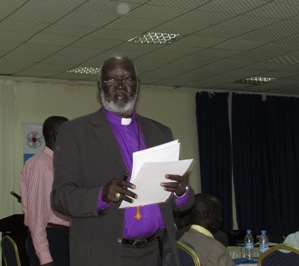S. Sudan churches urge traditional leaders to work for peace
September 2, 2014 (JUBA) – South Sudan’s Council of Churches has called on traditional chiefs and elders to play a role in spreading a message of peace at a grassroots level in their local communities.

“Our traditional chiefs are intuited by God to work for peace in our communities. They settle disputes among the individuals, among groups that have gone into conflict, that have differed, that have harmed one another,” said Bishop Taban, the chairperson of South Sudan’s Council of Churches.
The bishop said both religious and traditional leaders shared a common mission in working towards reconciliation, peace-building, saying local chiefs had a particularly important role to play at a grassroots level.
Fighting erupted in South Sudan in mid-December last year among the presidential guard in Juba, before spreading to other key regions across the country.
President Salva Kiir has accused his former deputy, Riek Machar, of attempting to stage a coup to topple the government, something the rebel leader and his allies deny.
Warrap state, as well as neighbouring Unity to the south-west, have continued to witness sporadic attacks allegedly by armed forces loyal to Machar.
The conflict has divided along ethnic fault lines, with members of Kiir’s Dinka tribe accused of targeting ethnic Nuer, of which Machar belongs, at the start of the conflict.
A number of top Nuer military commanders subsequently defected and were responsible for carrying out revenge killings of Dinka tribesmen in rebel-controlled areas.
The workshop, which drew participants from Jonglei, Unity, Upper Nile and Warrap states, aims to mend this severed social fabric, Reverend Mark Akech, the council’s secretary-general told reporters on Monday.
“As a church, we understand this fighting as a conflict over leadership in the SPLM (South Sudan’s ruling party),” said Akech.
“We want the local people, the community, to know that they should not take part in this crisis that they don’t know. Let them live in harmony and talk [the] language of peace rather than attacking themselves unnecessarily,” he added.
(ST)
